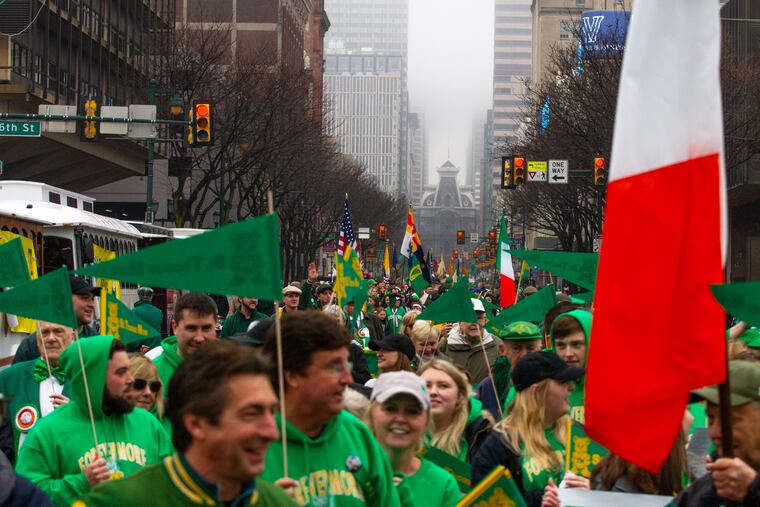Philadelphia’s St. Patrick’s Day parade canceled
City officials on Tuesday urged people to watch Sunday's parade from home. Hours later, parade organizers said the entire event would be canceled out of "general concern for the well-being of everyone."

The Philadelphia St. Patrick’s Day Observance Association late Tuesday night announced that it had canceled Sunday’s parade.
“After heartfelt consideration and serious conversation with officials from the City of Philadelphia, the St. Patrick’s Day Observance Association has decided to cancel the parade and all events related to the 2020 Philadelphia Saint Patrick’s Day Parade. This decision was made with significant input from civic and parade participants. While this decision is disappointing, we acted with a general concern for the well-being of everyone,” the association posted on its Facebook page at 9:45 p.m.
Earlier, officials had said they would go ahead as planned Sunday, but they urged spectators not to attend.
Because of the threat of coronavirus, the city had asked parade organizers to tell people to turn on their TVs and not attend in person, Philadelphia Managing Director Brian Abernathy said.
“The organizers were understanding of the city’s position," Abernathy said before the parade was canceled. “They are still planning to have the parade with the understanding that we’d prefer folks not attend.”
City officials had been grappling with what to do about the parade against an unnerving historical backdrop: The decision just more than a century ago to go ahead with a World War I Liberty Loan parade on Broad Street during the 1918 flu pandemic. Epidemiologists now view that parade as a classic blunder that led to a spread of a disease that claimed 12,000 lives in Philadelphia.
Harvard epidemiologist Marc Lipsitch, an expert on the nation’s response to the 1918 pandemic, urged Philadelphia on Tuesday to cancel the parade. He noted that Boston canceled its St. Patrick’s Day parade Monday hours after he spoke out against holding it.
“Waiting until you know you have a problem is courting a catastrophe,” Lipsitch said.
Lipsitch is the coauthor of a 2007 scholarly article that explored how different American cities responded to the 1918 influenza pandemic. “Particularly striking,” the article found, was the high death rate in Philadelphia, which responded slowly to the disease, and St. Louis, which was quick to shut down a wide array of public events.
The death rate in Philadelphia was twice that of St. Louis’, hitting 719 fatalities for every 100,000 residents compared with 347 per 100,000 in the Midwestern city.
"There is nothing about the present situation, with respect to the lifesaving value of public health measures, that is substantially different from the 1918 influenza situation, " said Joshua Plotkin, professor of natural sciences at the University of Pennsylvania who has studied the spread of infectious diseases.
Other cities, including Dublin in Ireland, have canceled their parades, while New York and Chicago have signaled they will go ahead with their celebrations.
Doctors had urged Philadelphia to cancel the parade in 1918, but their warnings could not overcome the war fever then gripping the city. Some 200,000 people lined Broad Street on a day that was capped off by a concert led by John Philip Sousa.
On Oct. 3, 1918, five days after the parade, Philadelphia closed all schools, churches, theaters, pool halls, and other gathering places. Despite those measures, 800 people died from the flu in Philadelphia on Oct. 12, the deadliest day of the outbreak in the city.
» READ MORE: Coronavirus has shut down schools and events. Here’s why that helps, short- and long-term.
In the 2007 article, published in the journal of the National Academy of Sciences, Lipsitch and coauthors Richard J. Hachett and Carter E. Mecher dug into public health data to look at death rates in 17 U.S. cities and to contemporary news accounts to see how the cities had responded. Among other public health measures, cities took such steps as isolating the ill; closing schools, houses of worship, theaters, and dance halls; and banning public funerals and crowding on streetcars.
The found that for the cities as a group, death rates from influenza were 50% lower in those that tackled the problem quickly.
“The main lesson of the work is that early intervention saves lives. It slows down the transmission, it flattens the curve,” Lipsitch said. " That means the total number that get infected is lower and the peak is lower."
Lowering the peak, he said, gives hospital and doctors more time to address a lighter caseload of patients.
» READ MORE: Coronavirus has shut down schools and events. Here’s why that helps, short- and long-term.
In a paper released this month, Lipsitch and other researchers cited new evidence that a quick response saves lives. They contrasted data from Wuhan, the center of China’s outbreak, and Guangzhou, a Chinese metropolis to the south of Wuhan. Guangzhou, quicker to take “social distancing steps” to attack coronavirus, had only 271 hospitalization on its peak day.
Wuhan, the study found, had 19,425.